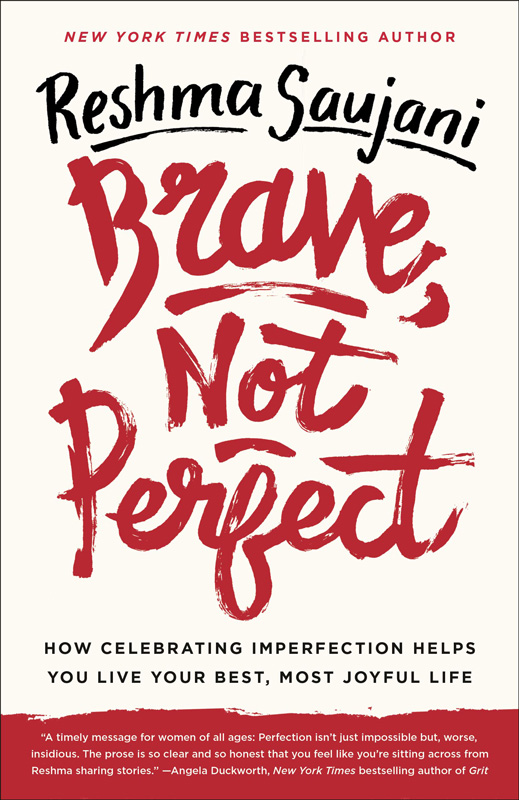Reshma Saujani began her career as an attorney and activist. In 2010, she surged onto the political scene as the first Indian American woman to run for U.S. Congress. During the race, Reshma visited local schools and saw the gender gap in computing classes firsthand, which led her to start Girls Who Code in order to close the gender gap in technology and change the image of what a computer programmer looks like and does.
As well as being the CEO of Girls Who Code, Reshma Saujani has also published several best-selling books, is a regular speaker at major events such as TED conferences and is happily married with 2 wonderful children. The true definition of a successful MOM.CEO!
Reshma's new book recently launched on May 5th and is now available for purchase.
MOM.CEO: You’re a leader and a committed mom. What’s your secret to making it work?
Reshma Saujani: Honestly, there are no secrets. It’s hard work and sometimes I mess up. My book, Brave, Not Perfect, is all about how women are raised to strive for perfection and fear failure. So I’ve been working with this community we’ve created to normalize the idea that we all fail. Every week, I post my #FailureFriday on Instagram, which is basically where I talk about a mistake from that week.

The Saujani Family Photo Credit: Reshma Saujani Instagram
It’s easy to look at professional moms and think they have it all together, but we’re all just trying our best. I think we have to be honest about that to show women that they can take risks and chances and mess up, and still be successful in the end.
MOM.CEO: The word NO is a powerful word in business, but does its meaning work as well in your home?
Reshma Saujani: I’m actually working on saying “NO” more often. In our pursuit of perfection, women often feel as though they have to say yes to everything - but men don’t feel like that and we shouldn’t either. I think my ability to say no at work gives me the space to say yes to myself - yes to spending time working out, yes to being there for my son and husband, yes to taking maternity leave when my second baby boy was born. Saying yes to your own needs is really important, but sometimes we have to say NO in other places to get there.
"Ultimately it’s all about balance."
MOM.CEO: You once said that girls need to “Learn to be imperfect in order to thrive.” As a mother, can you give us some tips on how other mothers can implement this thinking in regards to their daughter’s education/upbringing?
Reshma Saujani: It’s not just about mothers - it’s about fathers too! Parents should encourage their daughters to take risks, to try new things, to stick with activities even if they think they’re bad at it. I always say that we let our boys climb to the top of the monkey bars and jump, and we should let our girls do the same. If your daughter is on the swim team, or the debate team, or the gymnastics team - don’t pull them out if they’re not very good.
"Let them try, let them fail."
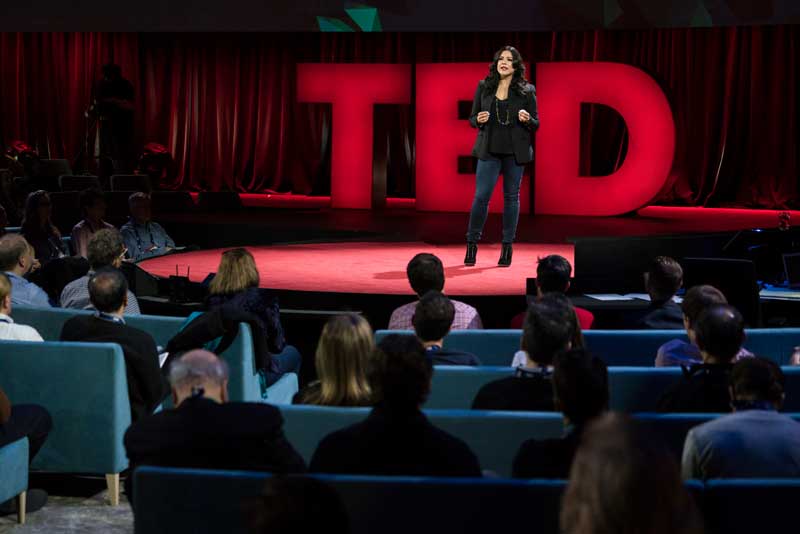
Reshma speaking at a TED conference about taking risks and being brave! Photo Credit: Reshma Saujani
MOM.CEO: Being a public figure, what has been the hardest lesson you've had to learn about balancing leadership and motherhood?
Reshma Saujani: I think it’s really important to have a healthy work/life balance, but sometimes I find myself thinking that that means that these two parts of my life exist totally independently of each other. But that’s not how it works. The truth is if something bad happens in your personal life, you’re going to have a bad day at work.
My husband and I have had a long struggle with trying to have a second child and there are so many days I just wanted to break down and cry at work. I found myself thinking that I couldn’t let it bother me - that on bad days I had to say yes to getting on that plane anyway, to taking that call anyway, even though I felt horrible. And I’ve learned that it’s ok to not be ok. It’s ok to take a personal day, it’s ok to need to say no. And I think that’s something a lot of women struggle with - knowing when it’s ok to say no and advocate for themselves. And I hope that more and more women will learn that sometimes that’s exactly what you have to do.
RELATED ARTICLE
[post_0]
MOM.CEO: In your TED speech, you said that most girls are taught to avoid risk and failure while boys are taught to take risks and be brave. Do you believe this is the reason why there is a disproportionate amount of men in leadership roles as opposed to women?
Reshma Saujani: It’s definitely part of it. We train women to avoid risk and failure, so they’re less likely to ask for a raise or a promotion. We know that women won’t apply for jobs unless they are 100% qualified, while men will apply for jobs when they’re only 60% qualified. So women are really keeping themselves out of the running. But, the problem doesn’t just lie with women. We need hiring managers and middle management to believe in women, to promote them, to advocate for them. Hopefully, we can have both - women that will be brave in asking for what they deserve, and a corporate culture that actually elevates women who are doing really great work.
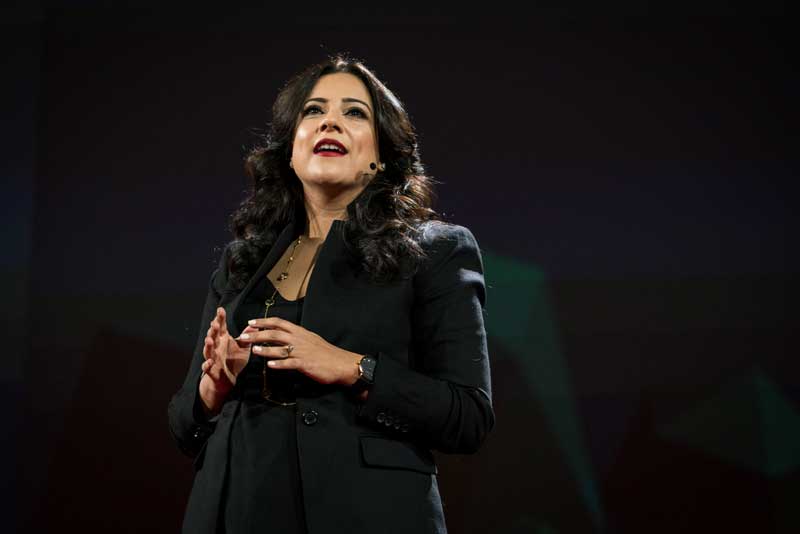
It's all about being Brave, Not Perfect! Photo Credit: Reshma Saujani
MOM.CEO: BUT! There is a fast-growing number of women who are now taking over major companies and leadership roles, as well as in politics. Is this now the time to “step on the gas” and educated girls to be even braver?
Reshma Saujani: It is always time to “step on the gas.” I am so proud to see so many women rising to leadership positions - it is so inspiring! And it’s inspiring for our girls too. Girls are starting to see role models who look like them in politics, in leadership. But we have a lot of work to do. I want every little girl who wants to be an astronaut, a CEO, a President to be able to look around and find a role model who looks like her. So this is absolutely the time to encourage our girls to be brave because they are our leaders of tomorrow and quite frankly, some of them are already becoming our leaders today.
MOM.CEO: Guy Kawasaki said in a recent DAD.CEO interview:
“I fundamentally believe that women can make better CEOs. I think they don’t have this male desire to kill stuff. This male thinking:‘If I lose, you win and I win, you lose."
If we taught our daughters to be braver and to take on more risks in reaching for higher positions of influence, do you believe our economy would be in better shape? Would it increase our chances of a more stable and peaceful world?
Reshma Saujani: We have seen time and time again that diversity is good for us. It’s good for business, it’s good for politics. Having diverse voices in leadership benefits everyone, so of course, having more brave women in power would improve our world. I also know that girls can change the world. I see it every day with my work at Girls Who Code. These girls learn how to code, they learn bravery, and they go on to create tech that tackles the world’s problems - like gun safety, reproductive rights, immigrant rights.

Inspiring the next generation of Girls Who Code! Photo Credit: Reshma Saujani
MOM.CEO: What issues are you hoping to instill in your children to help influence their future success?
Reshma Saujani: I’m constantly talking about how we must raise our girls to be brave, not perfect. At the same time, I’ve tried really hard to surround my son and now his little brother with images of strong women - so my children grow up knowing that everyone is capable of great things. I love Halloween and every year, I pick a different feminist icon for my whole family to dress up as - some past hits have included the notorious RBG and Megan Rapinoe. All I can do is give my kids a framework for how to see the world and then they really just have to do a lot of trial and error to succeed and I’m excited to support them through that.
MOM.CEO: Do you believe parents should invest financially in their kids’ start-ups? If no, how do you believe is the best way for them to learn and earn their own way?
Reshma Saujani: Some kids are really lucky to have the sort of financial support and backing behind them. But that support isn’t available for everyone and starting a company comes with a lot of ups and downs. Through planning and investing rounds, you meet with a lot of failures, but it can really pay off in the end. It’s why we have to teach our kids, especially our girls, bravery so everyone can take a risk and just see what happens. And if it fails, then you learned something, and you pick up and try the next thing.
MOM.CEO: We understand that you are a strong supporter of women’s education and empowerment with Girls Who Code. Can you tell us about this and how can others get involved?
Reshma Saujani: So almost a decade ago, I was running for office in New York--and I spent a lot of time on the campaign trail visiting schools. In every single school, I noticed something. In front of every row of computers, was a row of boys. Classroom after classroom. Not a girl in sight.
We all know that tech is one of the highest-paying, fastest-growing industries in the country. These jobs can lift entire families and communities up into the middle class. I knew back then that if our girls weren’t taking computer science in elementary school or middle school, then they had little to no chance of making it into the industry. No chance of achieving the American Dream.
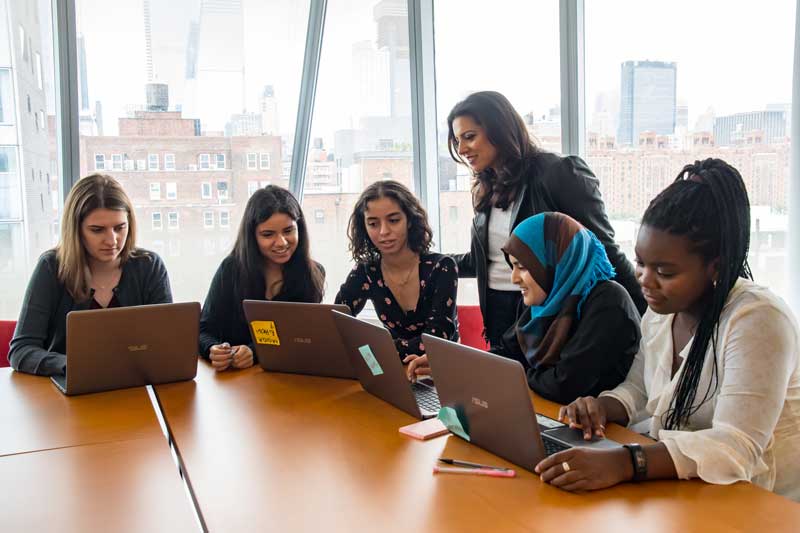
Reshma Saujani with Girls Who Code students Photo Credit: Reshma Saujani
So, I started Girls Who Code. I bought the URL, borrowed some office space from a friend, and recruited 20 girls for the first-ever Girls Who Code Summer Immersion Program. And now, we’ve been working to close the gender gap in tech for almost eight years and we’ve reached over 185,000 girls.
If you want to get involved, start a club, tell the girls you know about Girls Who Code, encourage girls to take computer science. And make an effort to resist the stereotype that only boys belong in tech. Talk about important women in tech -- Grace Hopper, Ada Lovelace, etc. -- and raise up the women you know who are fighting to change tech culture.
MOM.CEO: How would you want to look back and be remembered as a mother and leader?
Reshma Saujani: I want my family at home and at Girls Who Code to remember that I encouraged them to be brave. Our office is filled with women of all different backgrounds and I know we all have this same drive for perfection in us. I’ve really tried to create a space where my employees feel empowered and feel comfortable advocating for themselves - where they can be brave at work. And I’ve tried to set the same example for my sons - I want both of them to be brave and I want them to grow up seeing brave men and women all around them.
MOM.CEO Any last words of wisdom or tips on being a MOM.CEO?
Reshma Saujani: I got to where I am today through bravery. And it’s not always easy. I think we all really have to exercise our bravery muscles before it feels natural, so I just want to encourage women to be brave, not perfect whenever possible.
"Fear Less, Fail More, and Live Bolder!"
About Reshma Saujani
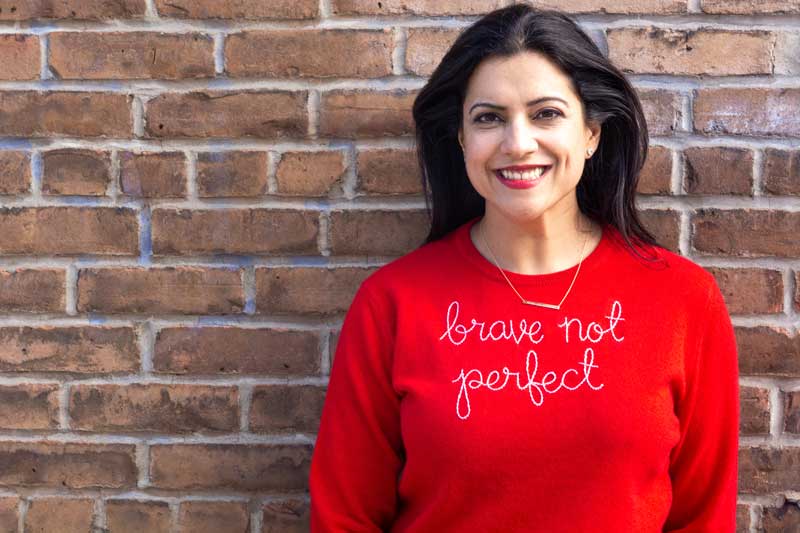
Photo Credit: Reshma Saujani
Reshma Saujani is the Founder and CEO of Girls Who Code, an international non-profit organization working to close the gender gap in technology and change the image of what a programmer looks like.
With their 7-week Summer Immersion Program, after school Clubs, College Loops program, and 13-book New York Times best-selling series, they are leading the movement to inspire, educate, and equip young women with the computing skills to pursue 21st-century opportunities.
Girls Who Code has reached over 185,000 thousand girls across all 50 states, Canada, India, and the UK.
Reshma’s book, Brave, Not Perfect, inspired by her TED talk with more than four million views, “Teach girls, bravery not perfection,” has sparked a national conversation about how we’re raising our girls and how women can leave perfection behind.





